Unit 7 Food festival Topic 2 I’m not sure whether I can cook it well. SectionB 课件27张
文档属性
| 名称 | Unit 7 Food festival Topic 2 I’m not sure whether I can cook it well. SectionB 课件27张 | 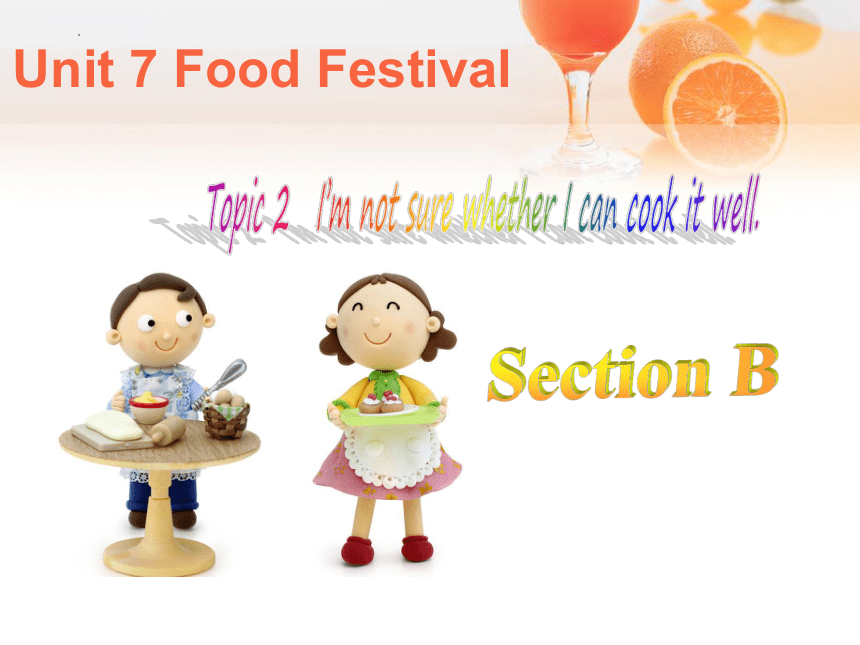 | |
| 格式 | pptx | ||
| 文件大小 | 9.2MB | ||
| 资源类型 | 教案 | ||
| 版本资源 | 仁爱科普版 | ||
| 科目 | 英语 | ||
| 更新时间 | 2022-03-26 21:20:38 | ||
图片预览

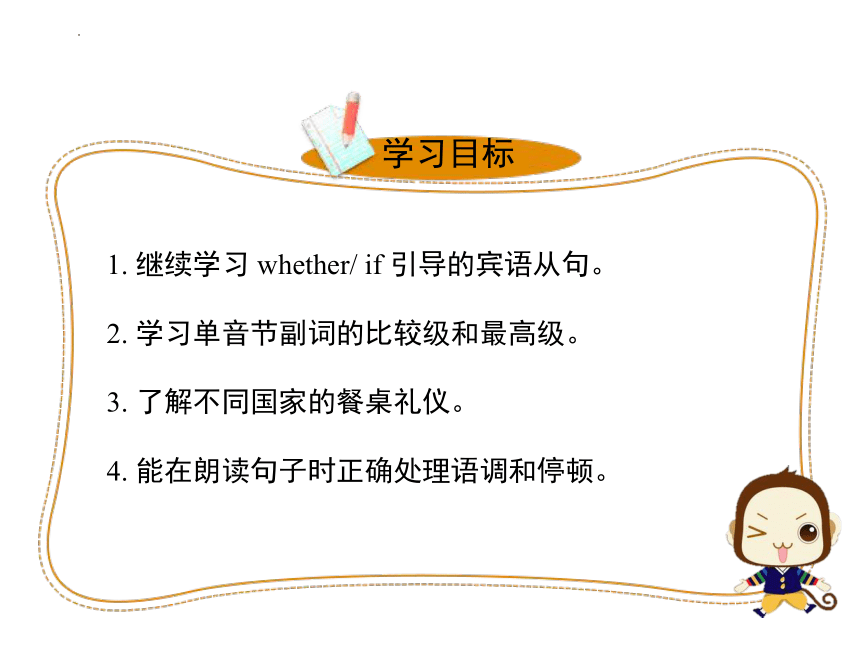
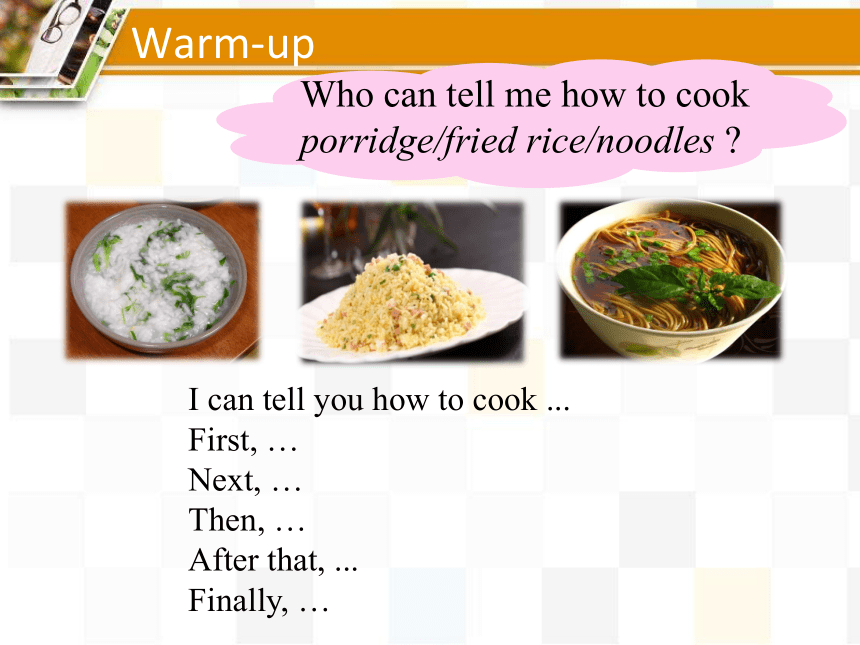
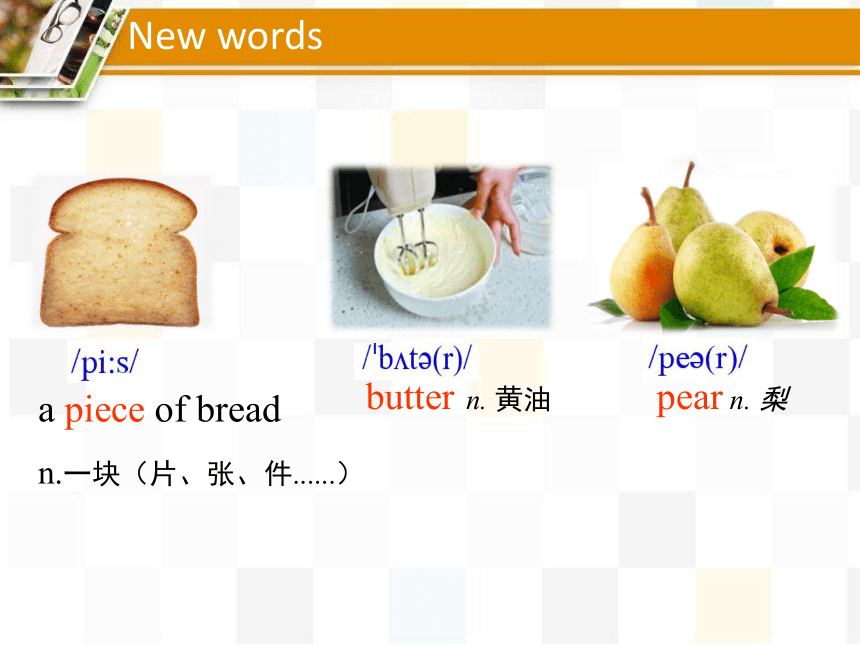
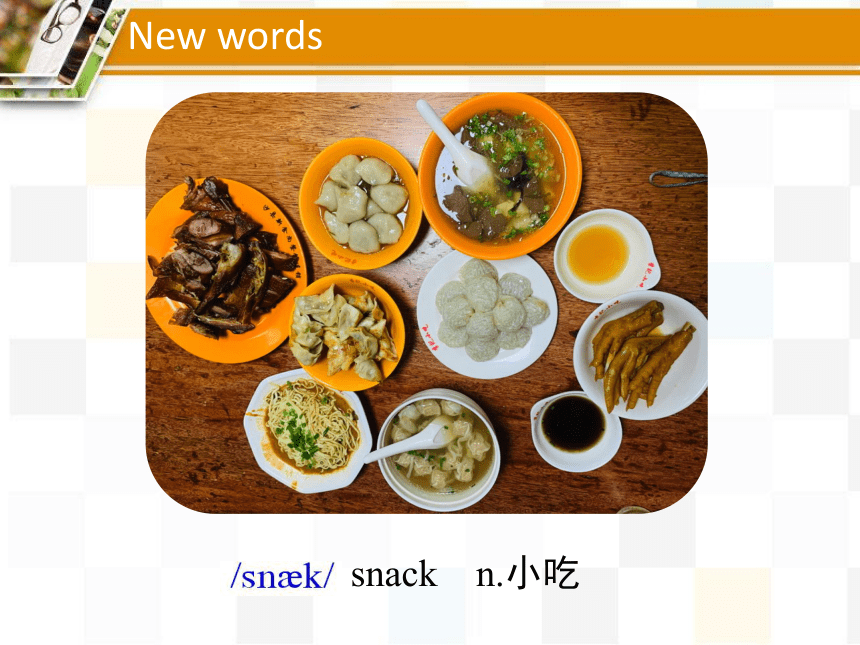
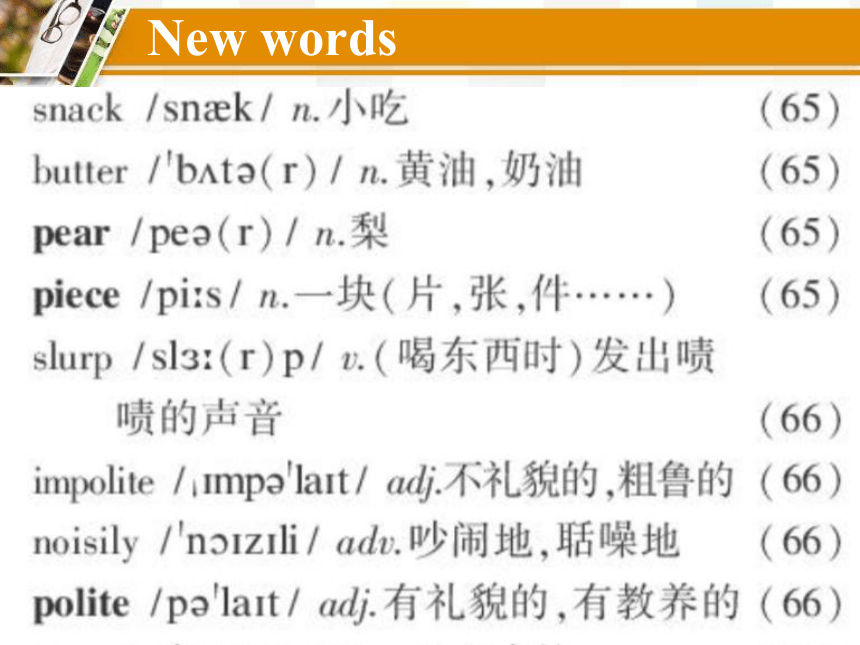
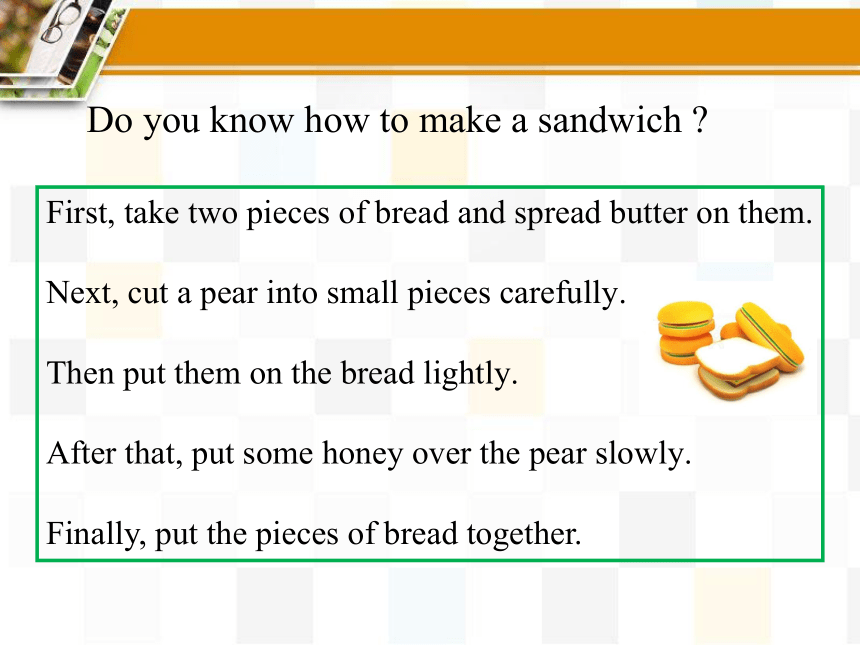
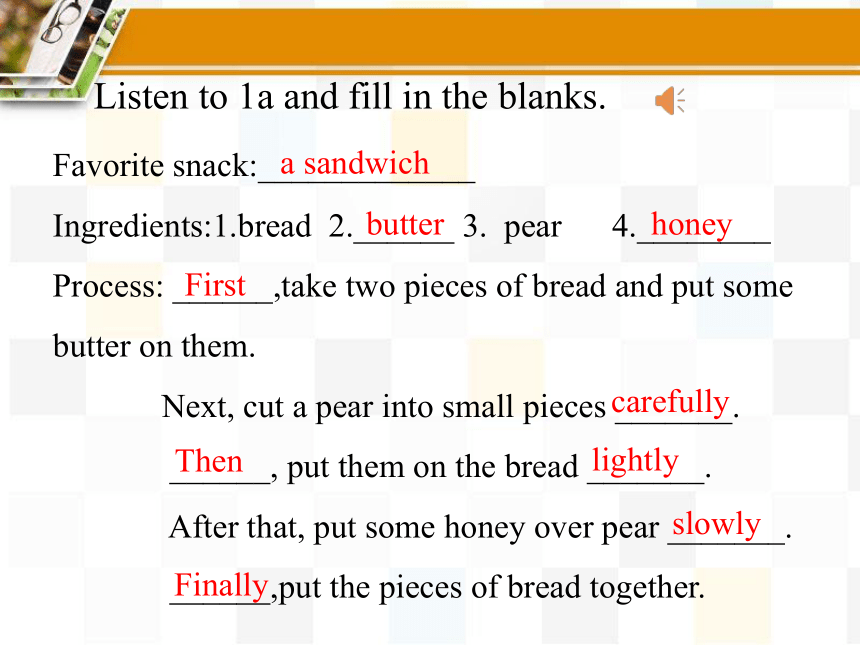
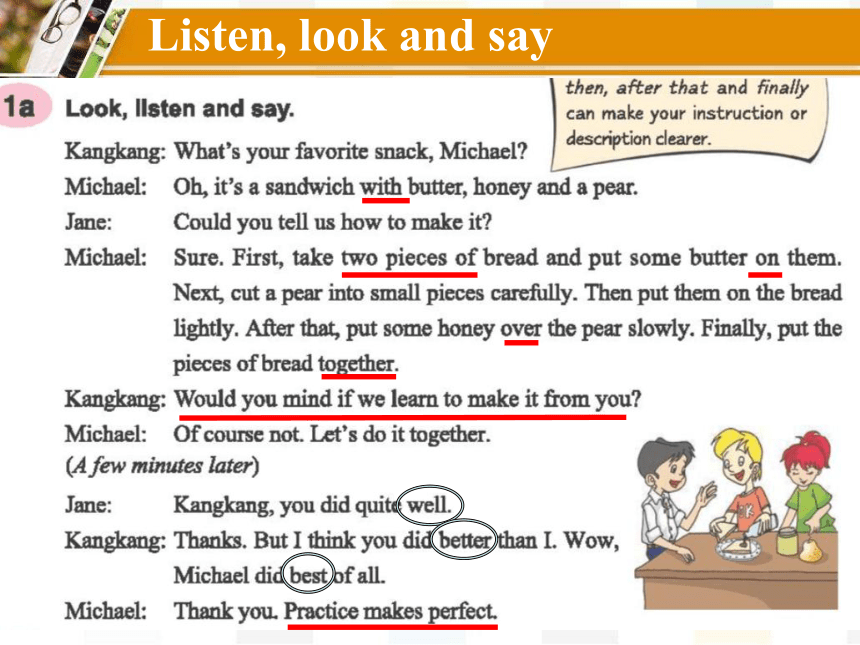
文档简介
(共27张PPT)
Unit 7 Food Festival
Topic 2 I’m not sure whether I can cook it well.
Section B
学习目标
1. 继续学习 whether/ if 引导的宾语从句。
2. 学习单音节副词的比较级和最高级。
3. 了解不同国家的餐桌礼仪。
4. 能在朗读句子时正确处理语调和停顿。
Who can tell me how to cook
porridge/fried rice/noodles
I can tell you how to cook ...
First, …
Next, …
Then, …
After that, ...
Finally, …
Warm-up
butter n. 黄油
pear n. 梨
a piece of bread
n.一块(片、张、件......)
New words
snack n.小吃
New words
New words
First, take two pieces of bread and spread butter on them.
Next, cut a pear into small pieces carefully.
Then put them on the bread lightly.
After that, put some honey over the pear slowly.
Finally, put the pieces of bread together.
Do you know how to make a sandwich
Favorite snack:_____________
Ingredients:1.bread 2.______ 3. pear 4.________
Process: ______,take two pieces of bread and put some butter on them.
Next, cut a pear into small pieces _______.
______, put them on the bread _______.
After that, put some honey over pear _______.
______,put the pieces of bread together.
a sandwich
butter
honey
First
carefully
lightly
Finally
slowly
Then
Listen to 1a and fill in the blanks.
Listen, look and say
知
识
总结
Language points
a piece of… 一块/片/张
two pieces of 两块/片/张
*谓语动词与piece保持一致
There ___ a piece of bread.
Two pairs of shoes ____ needed at school.
2. on 在…上面 (接触)
over 在…正上方(不接触)
into/in 在…里面
is
are
知
识
总结
Language points
3.Would you mind if we learn to make it from you
(1)Would you mind if...表示请求允许、或客气地请某人做某事= would you mind doing…
Would you mind if I open the window
Would you mind opening the window
(2)learn to do sth. from sb. 向某人学习做某事
He learns to play chess from his father.
一般在词尾直接加-er 或-est tall taller/tallest
在“1元+1辅”重读闭音节中, 先双写末尾的辅音字母,再加-er或-est fat fatter/fattest
以不发音的e结尾的单音节词,只加-r或-st cute cuter/cutest
以“辅音字母 + y”结尾的双音节词, 需改y为i,再加-er或-est heavy heavier/heaviest
部分双音节和多音节的形容词, 在前面加more或most beautiful more beautiful/
most beautiful
Review:形容词比较级、最高级的规则变化
不规则变化要特殊记!
Gammar I
副词的比较级和最高级
* 副词有原级、比较级和最高级三个等级, 其构成方式、基本用法与形容词比较等级相似。
* 副词比较等级的变化规则:
well–better-best
badly-worse-worst
much-more-most
little-less-least
far-farther-farthest
far-further-furthest
不规则变化
规则变化
直接加 er/est
去e加 er/est
前面加 more/most
改y为i加 er/est
注: 多音节或部分双音节副词,以及由
“形容词+ly”构成的副词,变比较级在
其前面加more,最高级加most。
副词比较等级的基本用法:
副词的等级 基本用法
原级 1.同级比较: (not) as…as;
2. 可用very/ quite/ too/ enough等副词修饰。
比较级 1. 两者比较,常与than连用; 2. 比较级+and+相同副词的比较级 <越来越…>; 3. The+比较级(+其他),the+比较级+(其他) <越…,越…>
最高级 三者或三者以上比较,最后可以用of/ in等介词短语来说明比较范围。
注意:形容词最高级前要加the,副词最高级前的the通常会省略。
( )用在as...as 间,( )用在than前面,
and 连接( ), 表示“越来越...”;
三者以上( ), 副词前可不加( )。
原级
比较级
比较级
最高级
the
Challenge Yourselves!
Task 1
Write the comparative and superlative degrees of the following adverbs correctly.
hard-( )-( ) slowly-( )-( )
early-( )-( ) badly-( )-( )
late -( )-( ) much-( )-( )
harder
hardest
more slowly
most slowly
earlier
earlist
worse
worst
later
latest
more
most
Task 2
Fill in the blanks with the correct forms of the words.
1. ---Who did the work______________(careful), Kate, Mary or Jane
---Mary did. (2017.长沙中考题改编)
most carefully
2. The_________(hard)you study, the________ (well) you do in exams.
(2018.湘潭)
harder
better
知
识
总结
4. —..., you did quite well.
—But I think you did better than I.
Michael did best of all.
句中的well, better, best都是副词
5. Practice makes perfect. 熟能生巧。
Read 1a and retell the process of making a sandwich, using first, next, then...based on 1b.
Michael arrives early.
Kangkang arrives earlier.
Jane arrives earliest.
Look at the pictures and match the parts of
the sentences.
Michael stays long.
Kangkang stays longer.
Jane stays longest.
Michael cooks well.
Kangkang cooks better.
Jane cooks best.
( ) OK, let me try.(Slurp!)
( ) Well, in Cuba, it’s impolite to eat so noisily. I don’t know if it is polite in Japan.
( ) OK. Mm, it’s delicious. (Slurp!)
( ) Not bad, Maria.
( ) Kumiko, is it too hot
( ) Come on, Kumiko!Help yourself to some soup.
( ) No.Why
( ) Oh.In Japan, it’s polite to do that. It means you like the food
very much.
Listen and number the sentences to form a conversation.Then practice with your partner.
1
2
3
4
5
6
7
8
I don’t know if it is polite in Japan.
我不知道在日本这样是否礼貌。
if/whether引导的宾语从句
这是由if引导的宾语从句,if意为“是否”,不能省略。
if和whether 都可以引导宾语从句,意为“是否”,两者通常能互换,且不可省略。从句表一般疑问的意义。
E.g: 我不能确定是否有不明飞行物。
I’m not sure if there are UFOs.
◆Understand the following sentences:
I don’t know if/whether I need to obey all the rules while I’m having dinner with my friends.
2. Could you tell me if/whether it’s polite to speak loudly at the table
3. I don’t know if/whether you are right.
if/whether引导的宾语从句
Compare the following things with your friends, then make a report after the example.
go to school/do one’s homework/play basketball/run/cook/... (early/well/fast...)
Example:
Wang Gang and I are good friends.I go to school earlier than he. But he does his homework better than I. ...
Project
cheap——jeep chain——Jane
cheer——jeer choose——juice
Read the pairs of words aloud,paying attention to the sounds of the underlined letters.Then listen and try to imitate.
A:Would you like to tell me how to cook the meal
B:Sure.What do you want to learn
A:Could you teach me how to make fried rice
B:Yes,it's easy.First,cut some cooked meat very finely.Next,put some oil in the pan.Then fry the meat lightly.After that,add the rice slowly and fry it for a few minutes.Finally,add some salt.
A:Yeah! Cooking is fun!
Listen and read the conversation,paying attention to the intonation and pause.Then practice with your partner.
When you describe more than one step, you often use rising tone for such words as first, second before you come to the end.
( ) 1. I don’t know ____ he is right .
A. that B. what C. if
( ) 2. Which one goes ____, the car, the train or the plane
A. fast B. faster C. fastest
( ) 3. I would like a sandwich_______ honey.
A. for B. with C. of
( ) 4. It’s polite______ up your hand before answering the questions.
A. put B. putting C. to put
( ) 5. —Would you mind if I learn English from you
—__________. I am very glad to teach you.
A. Of course not. B. You’d better not.
C. Sounds great.
C
C
B
C
A
Exercises
单项选择。
Summary
We learn
1. Some new words:
snack, butter, pear, piece, slurp, impolite, noisily, polite
2.The comparative and superlative degrees of adverbs:
You did quite well.
But I think you did better than I.
Michael did best of all.
3. Object clauses with if/whether:
I don’t know if it is polite in Japan.
We can
1. Ask for permission:
Would you mind if we learn to make it from you
2. Make sandwich step by step.
Unit 7 Food Festival
Topic 2 I’m not sure whether I can cook it well.
Section B
学习目标
1. 继续学习 whether/ if 引导的宾语从句。
2. 学习单音节副词的比较级和最高级。
3. 了解不同国家的餐桌礼仪。
4. 能在朗读句子时正确处理语调和停顿。
Who can tell me how to cook
porridge/fried rice/noodles
I can tell you how to cook ...
First, …
Next, …
Then, …
After that, ...
Finally, …
Warm-up
butter n. 黄油
pear n. 梨
a piece of bread
n.一块(片、张、件......)
New words
snack n.小吃
New words
New words
First, take two pieces of bread and spread butter on them.
Next, cut a pear into small pieces carefully.
Then put them on the bread lightly.
After that, put some honey over the pear slowly.
Finally, put the pieces of bread together.
Do you know how to make a sandwich
Favorite snack:_____________
Ingredients:1.bread 2.______ 3. pear 4.________
Process: ______,take two pieces of bread and put some butter on them.
Next, cut a pear into small pieces _______.
______, put them on the bread _______.
After that, put some honey over pear _______.
______,put the pieces of bread together.
a sandwich
butter
honey
First
carefully
lightly
Finally
slowly
Then
Listen to 1a and fill in the blanks.
Listen, look and say
知
识
总结
Language points
a piece of… 一块/片/张
two pieces of 两块/片/张
*谓语动词与piece保持一致
There ___ a piece of bread.
Two pairs of shoes ____ needed at school.
2. on 在…上面 (接触)
over 在…正上方(不接触)
into/in 在…里面
is
are
知
识
总结
Language points
3.Would you mind if we learn to make it from you
(1)Would you mind if...表示请求允许、或客气地请某人做某事= would you mind doing…
Would you mind if I open the window
Would you mind opening the window
(2)learn to do sth. from sb. 向某人学习做某事
He learns to play chess from his father.
一般在词尾直接加-er 或-est tall taller/tallest
在“1元+1辅”重读闭音节中, 先双写末尾的辅音字母,再加-er或-est fat fatter/fattest
以不发音的e结尾的单音节词,只加-r或-st cute cuter/cutest
以“辅音字母 + y”结尾的双音节词, 需改y为i,再加-er或-est heavy heavier/heaviest
部分双音节和多音节的形容词, 在前面加more或most beautiful more beautiful/
most beautiful
Review:形容词比较级、最高级的规则变化
不规则变化要特殊记!
Gammar I
副词的比较级和最高级
* 副词有原级、比较级和最高级三个等级, 其构成方式、基本用法与形容词比较等级相似。
* 副词比较等级的变化规则:
well–better-best
badly-worse-worst
much-more-most
little-less-least
far-farther-farthest
far-further-furthest
不规则变化
规则变化
直接加 er/est
去e加 er/est
前面加 more/most
改y为i加 er/est
注: 多音节或部分双音节副词,以及由
“形容词+ly”构成的副词,变比较级在
其前面加more,最高级加most。
副词比较等级的基本用法:
副词的等级 基本用法
原级 1.同级比较: (not) as…as;
2. 可用very/ quite/ too/ enough等副词修饰。
比较级 1. 两者比较,常与than连用; 2. 比较级+and+相同副词的比较级 <越来越…>; 3. The+比较级(+其他),the+比较级+(其他) <越…,越…>
最高级 三者或三者以上比较,最后可以用of/ in等介词短语来说明比较范围。
注意:形容词最高级前要加the,副词最高级前的the通常会省略。
( )用在as...as 间,( )用在than前面,
and 连接( ), 表示“越来越...”;
三者以上( ), 副词前可不加( )。
原级
比较级
比较级
最高级
the
Challenge Yourselves!
Task 1
Write the comparative and superlative degrees of the following adverbs correctly.
hard-( )-( ) slowly-( )-( )
early-( )-( ) badly-( )-( )
late -( )-( ) much-( )-( )
harder
hardest
more slowly
most slowly
earlier
earlist
worse
worst
later
latest
more
most
Task 2
Fill in the blanks with the correct forms of the words.
1. ---Who did the work______________(careful), Kate, Mary or Jane
---Mary did. (2017.长沙中考题改编)
most carefully
2. The_________(hard)you study, the________ (well) you do in exams.
(2018.湘潭)
harder
better
知
识
总结
4. —..., you did quite well.
—But I think you did better than I.
Michael did best of all.
句中的well, better, best都是副词
5. Practice makes perfect. 熟能生巧。
Read 1a and retell the process of making a sandwich, using first, next, then...based on 1b.
Michael arrives early.
Kangkang arrives earlier.
Jane arrives earliest.
Look at the pictures and match the parts of
the sentences.
Michael stays long.
Kangkang stays longer.
Jane stays longest.
Michael cooks well.
Kangkang cooks better.
Jane cooks best.
( ) OK, let me try.(Slurp!)
( ) Well, in Cuba, it’s impolite to eat so noisily. I don’t know if it is polite in Japan.
( ) OK. Mm, it’s delicious. (Slurp!)
( ) Not bad, Maria.
( ) Kumiko, is it too hot
( ) Come on, Kumiko!Help yourself to some soup.
( ) No.Why
( ) Oh.In Japan, it’s polite to do that. It means you like the food
very much.
Listen and number the sentences to form a conversation.Then practice with your partner.
1
2
3
4
5
6
7
8
I don’t know if it is polite in Japan.
我不知道在日本这样是否礼貌。
if/whether引导的宾语从句
这是由if引导的宾语从句,if意为“是否”,不能省略。
if和whether 都可以引导宾语从句,意为“是否”,两者通常能互换,且不可省略。从句表一般疑问的意义。
E.g: 我不能确定是否有不明飞行物。
I’m not sure if there are UFOs.
◆Understand the following sentences:
I don’t know if/whether I need to obey all the rules while I’m having dinner with my friends.
2. Could you tell me if/whether it’s polite to speak loudly at the table
3. I don’t know if/whether you are right.
if/whether引导的宾语从句
Compare the following things with your friends, then make a report after the example.
go to school/do one’s homework/play basketball/run/cook/... (early/well/fast...)
Example:
Wang Gang and I are good friends.I go to school earlier than he. But he does his homework better than I. ...
Project
cheap——jeep chain——Jane
cheer——jeer choose——juice
Read the pairs of words aloud,paying attention to the sounds of the underlined letters.Then listen and try to imitate.
A:Would you like to tell me how to cook the meal
B:Sure.What do you want to learn
A:Could you teach me how to make fried rice
B:Yes,it's easy.First,cut some cooked meat very finely.Next,put some oil in the pan.Then fry the meat lightly.After that,add the rice slowly and fry it for a few minutes.Finally,add some salt.
A:Yeah! Cooking is fun!
Listen and read the conversation,paying attention to the intonation and pause.Then practice with your partner.
When you describe more than one step, you often use rising tone for such words as first, second before you come to the end.
( ) 1. I don’t know ____ he is right .
A. that B. what C. if
( ) 2. Which one goes ____, the car, the train or the plane
A. fast B. faster C. fastest
( ) 3. I would like a sandwich_______ honey.
A. for B. with C. of
( ) 4. It’s polite______ up your hand before answering the questions.
A. put B. putting C. to put
( ) 5. —Would you mind if I learn English from you
—__________. I am very glad to teach you.
A. Of course not. B. You’d better not.
C. Sounds great.
C
C
B
C
A
Exercises
单项选择。
Summary
We learn
1. Some new words:
snack, butter, pear, piece, slurp, impolite, noisily, polite
2.The comparative and superlative degrees of adverbs:
You did quite well.
But I think you did better than I.
Michael did best of all.
3. Object clauses with if/whether:
I don’t know if it is polite in Japan.
We can
1. Ask for permission:
Would you mind if we learn to make it from you
2. Make sandwich step by step.
同课章节目录
- Unit 5 Feeling excited
- Topic 1 You look excited
- Topic 2 I’m feeling better now.
- Topic 3 Many things can affect our feelings.
- Unit 6 Enjoying Cycling
- Topic 1 We're going on a three-day visit to Mount
- Topic 2 How about exploring Tian’anmen Square?
- Topic 3 Bicycle riding is good exercise.
- Unit 7 Food festival
- Topic 1 We’re preparing for a food festival.
- Topic 2 I’m not sure whether I can cook it well.
- Topic 3 I Cooked the Most Successfully
- Unit 8 Our Clothes
- Topic 1 We will have a class fashion show.
- Topic 2 We can design our own uniforms.
- Topic 3 He said the fashion show was wonderful.
